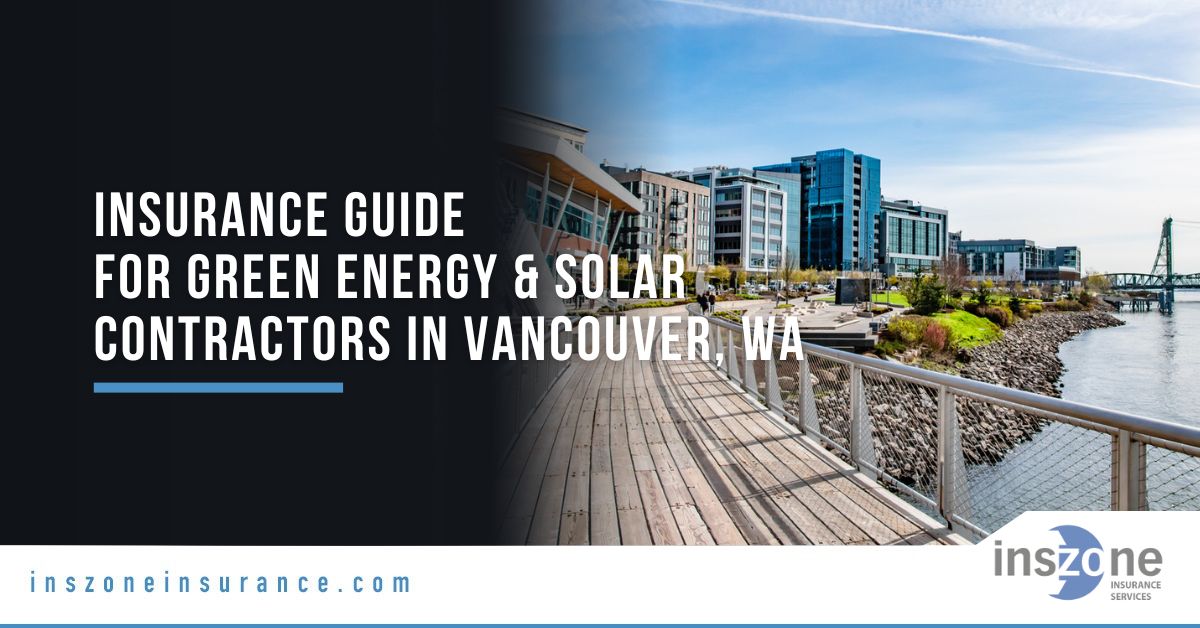As demand for clean energy rises across Washington, solar and green energy contractors in Vancouver are facing new risks and regulations. Whether you install rooftop solar panels, EV charging stations, or energy-efficient HVAC systems, comprehensive insurance is essential.
What Insurance Coverages Do You Need?
Core Coverages:
- General Liability Insurance: Covers third-party injury, property damage, or legal fees.
- Workers’ Compensation: Mandatory for employees in Washington. Covers job-related injuries.
- Commercial Auto: Covers vehicles and potential liability during site visits or transport.
- Contractor’s Equipment Insurance: Protects tools and high-value tech used in green installations.
- Professional Liability (E&O): Covers claims tied to design, consulting, or system performance errors.
- Pollution Liability: Crucial for contractors working near sensitive sites or handling battery/storage installs.
- Installation Floater/Builder’s Risk: Covers materials and in-progress work until job completion.

Specialist technician professional engineercontrol drone checking top view of installing solar roof panel on the factory rooftop under sunlight. Engineers holding tablet check solar roof.
Why It’s Important in Vancouver, WA
- High Growth Sector: Clark County’s clean energy initiatives are boosting solar adoption.
- Frequent Site Visits: Mobile crews increase vehicle and jobsite risk.
- Grid-Tied Systems: Installation mistakes can cause system damage or power loss.
- Battery/Storage Systems: Improper handling can lead to fire or chemical exposure.
- Wet Climate & Roof Work: Slippery conditions increase liability risk during solar installs.
Who Needs This Coverage?
- Solar panel installers (residential/commercial)
- EV charger installers
- Battery storage system contractors
- Energy-efficient HVAC and insulation providers
- Renewable energy consultants and designers
When Should Policies Be Reviewed?
- Annually: Confirm coverage limits, deductibles, and new business risks.
- After Expansion: New services, tech, or crew hires.
- New Projects: Review contract requirements (often higher liability thresholds).
- After Any Claim or Incident: Adjust based on exposure or gaps.
Where Are the Risks?
- Residential Rooftops: Risk of falls, leaks, or electrical fires.
- Commercial Installs: Higher liability exposure and contract expectations.
- Public Infrastructure: EV chargers or solar farms near schools or parks increase scrutiny.
- Sensitive Environmental Areas: Wetlands and riverfront properties may require pollution insurance.
How to Lower Insurance Costs
- Implement crew safety protocols and OSHA-compliant training.
- Maintain clean driving and claims records.
- Use renewable energy certifications to qualify for policy discounts.
- Bundle policies (GL, Auto, Tools) with one provider.
- Work with brokers experienced in energy and solar risk.
Local & Regulatory Context (2024–2025)
- Washington Clean Energy Transformation Act (CETA): Mandates 100% clean electricity by 2045.
- City of Vancouver’s Climate Action Plan: Targets carbon neutrality by 2040, incentivizing solar adoption.
- WA L&I Enforcement: All contractors must hold valid licenses and carry required insurance.
- Increased demand from public-private partnerships (e.g. schools and municipalities installing solar).
Key Takeaways
- Solar contractors face unique installation, tech, and environmental risks.
- Vancouver’s clean energy push increases demand—and liability.
- Stay compliant with Washington insurance and licensing laws.
- Tailor your insurance portfolio to match specialized risks in green energy.

